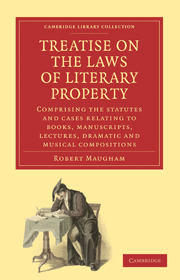 Treatise on the Laws of Literary Property
Treatise on the Laws of Literary Property Book contents
- Frontmatter
- LAWS OF LITERARY PROPERTY
- ANALYTICAL TABLE OF CONTENTS
- BOOK I HISTORICAL VIEW OF THE LAW
- BOOK II THE PRESENT STATE OF THE LAW
- BOOK III DISQUISITIONS ON THE PRINCIPLES OF THE LAWS AND THEIR EFFECT ON LITERATURE
- FIRST PART. OF THE LIMITATION OF COPYRIGHT TO TWENTY-EIGHT YEARS
- SECOND PART. OF THE LIBRARY TAX OF ELEVEN COPIES OF EVERY BOOK
- NOTES, COMPRISING AUTHORITIES REGARDING THE LIMITATION OF COPYRIGHT, AND THE LIBRARY TAX
- TABLE OF CASES CITED OR REFERRED TO, AND WORKS OR SUBJECTS LITIGATED
- INDEX
- ERRATA
SECOND PART. OF THE LIBRARY TAX OF ELEVEN COPIES OF EVERY BOOK
Published online by Cambridge University Press: 05 August 2011
- Frontmatter
- LAWS OF LITERARY PROPERTY
- ANALYTICAL TABLE OF CONTENTS
- BOOK I HISTORICAL VIEW OF THE LAW
- BOOK II THE PRESENT STATE OF THE LAW
- BOOK III DISQUISITIONS ON THE PRINCIPLES OF THE LAWS AND THEIR EFFECT ON LITERATURE
- FIRST PART. OF THE LIMITATION OF COPYRIGHT TO TWENTY-EIGHT YEARS
- SECOND PART. OF THE LIBRARY TAX OF ELEVEN COPIES OF EVERY BOOK
- NOTES, COMPRISING AUTHORITIES REGARDING THE LIMITATION OF COPYRIGHT, AND THE LIBRARY TAX
- TABLE OF CASES CITED OR REFERRED TO, AND WORKS OR SUBJECTS LITIGATED
- INDEX
- ERRATA
Summary
CHAP I.—THE GROUNDS OF THE LIBRARY CLAIM EXAMINED
Having brought before the reader the state of the law with reference to the contracted period during which the rights of authors are protected, and animadverted upon the monstrous injustice of permitting the productions of intellectual labor to become the object of common plunder after twenty-eight years, whilst the fruits of ordinary industry were wisely secured in perpetuity; we now turn to the consideration of the next feature of oppression in these statutes “for the encouragement of learning.” After curtailing the duration of the right of literary property, from a perpetuity to the brief term of twenty-eight years (in return for which restraint, it might have been anticipated that some splendid boon was intended to be conferred) the Acts of Parliament proceed to impose a tax of eleven copies on every publication, whether the most rare and expensive, or the cheapest and most insignificant.
Although the statutes impose a penalty of three pence per sheet for pirating copyright, the old mode of redress by an action at law for damages, or an injunction and an account in equity has always been and is still preferred.
- Type
- Chapter
- Information
- Treatise on the Laws of Literary PropertyComprising the Statutes and Cases Relating to Books, Manuscripts, Lectures, Dramatic and Musical Compositions, pp. 196 - 208Publisher: Cambridge University PressPrint publication year: 2010First published in: 1828


